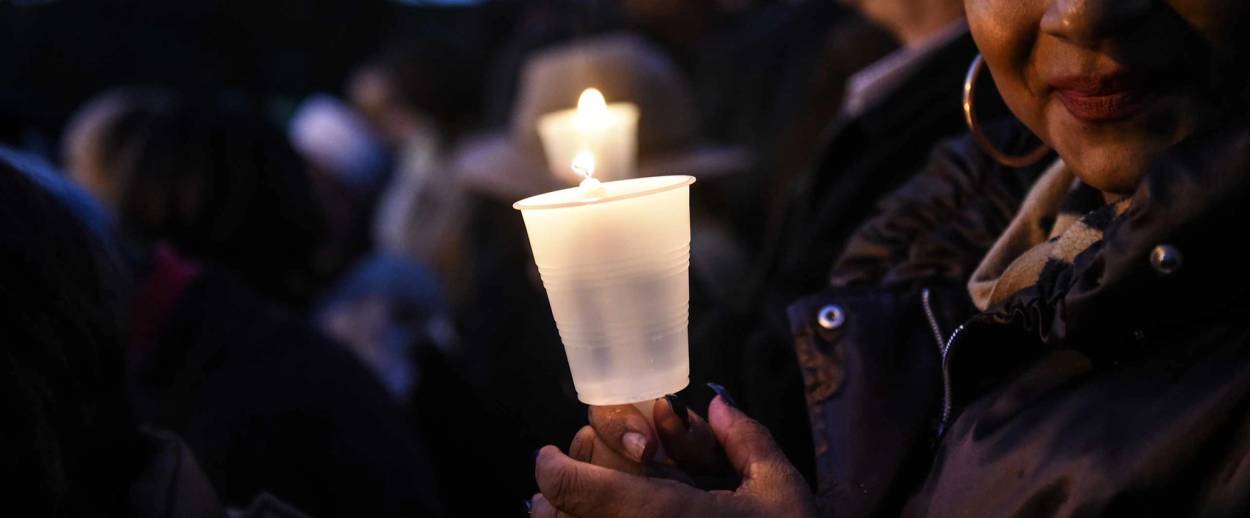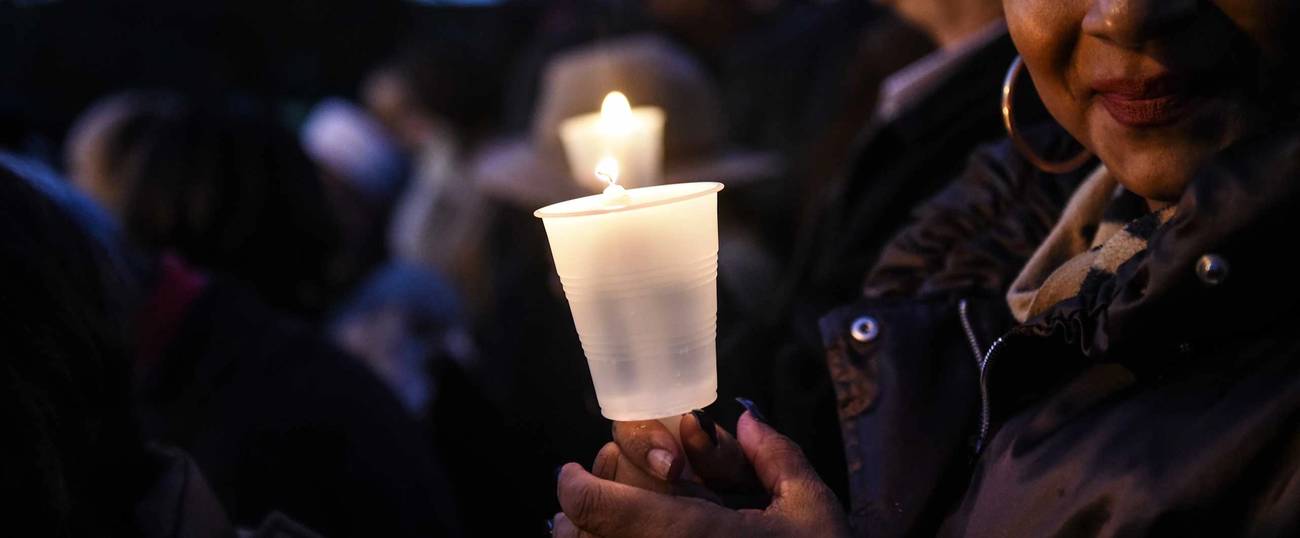A Year After Pittsburgh, Time for Action
Here’s what Americans, Jewish and non-Jewish alike, can do now that the period of mourning is over




This past Sunday, we mourned on the first anniversary of the Tree of Life shooting. In Jewish tradition, this is an important moment. Mourners have completed saying the daily Mourner’s Kaddish, released from their daily obligations and restrictions as the official period of mourning has passed. Graves are visited and headstones have been unveiled.Those who lost their beloved family members are no longer considered mourners.
Grief, however, has no expiration date.
The pain of these violent, cruel deaths, wrought by a white nationalist terrorist, is unimaginable and will linger for families and for the entire Jewish community. It has changed us. The time for grieving is ending, and the time for action is upon us. We have had a year to mourn, to rage, think, to write, to organize, to cry, but overwhelmingly we haven’t learned the lessons of the Tree of Life. We must heed the call, we must learn the lessons now.
Anti-Semitism continues to grow and the Jewish community is frightened. A landmark new poll from the American Jewish Committee reveals stark realities: Nine out of 10 Jews believe anti-Semitism is spreading in America, and one-third of American Jews have hid their Jewishness in public. These numbers don’t surprise me. I am also frightened.
But I believe we must stand up and fight anti-Semitism. It is our patriotic duty, for anti-Semitism is a threat to all Americans.
First, we need to have a national conversation about anti-Semitism. Most Americans are still woefully ignorant about it. They don’t understand that anti-Semitism often functions as a conspiracy theory, where Jews are cast as evil demonic monsters controlling and manipulating the government, the media, the banks, and the whole world for greedy and nefarious gains. Anti-Semitism is a serpent that can easily adapt itself to different worldviews and political aims as it provides a scapegoat and an antidote to what ails us. This is also what makes it so devastating for democracy: It removes accountability.
This is a moment in which all Americans of conscience are working to learn about each other, to understand each other and the dangers we face. America must learn about anti-Semitism, recognize the tropes, the particular terrors and the devastating history. America must listen to Jews.
Second, we need to start demanding accountability from our fellow Americans. There will be times where this is politically convenient. There will be times when it is not. On the right, too many, including President Trump, still freely use terms like “hordes” or “invaders” to describe the refugees hoping to enter America in search of safety and a better life. This kind of language clearly inspired the Tree of Life shooter and they are culpable for inflaming violence against Jews and other historically oppressed people. On the left, anti-Semitic sentiments have, sadly, become all too easy to ignore or even accept, and it infects everyone from activists on the ground to members of Congress. Anti-Semitic rhetoric strengthens the violent white nationalist movement—no matter what political party you belong to. Anti-Semitism is corrosive to the fight for democracy, racial justice, economic justice, LGBTQ rights, immigrant rights, women’s rights and more—letting ourselves off the hook only weakens the fight for a more just America. Regardless of where we stand politically we must demand better, and we should begin precisely by holding our own side as accountable as we do those whose politics we find abhorrent.
Third, no matter how angry we are at each other, no matter how damaged community relations become, we must remember who stands to gain from a breakdown in community dialogue. Our most violent foes revel in intercommunity tension. It is so easy, especially in times of great fear, to divide communities into us versus them. We must demand accountability in ways that allow for learning, for growth, for change. We cannot forget that the white nationalists who seek a mass ethnic cleansing of America, who view all civil rights victories as the product of the Jewish community conspiracy to eradicate the white race, who bear responsibility for the loss of life in Pittsburgh, are strengthened and heartened by moments that divide Americans along ethnic lines. They believe we cannot live together. We must always, always seek to prove them wrong. Even when we are very, very angry. Even when we are frightened. We must prove them wrong.
We can live together as one flawed but ever-evolving country that still aspires to its highest values that we have never truly lived.
Lastly, we must turn grief into action. I am deeply inspired by members of the Squirrel Hill community, who took this act of extreme violence, hatred and cruelty and managed to do good. We can all learn from them. Bari Weiss, who turned her grief into a book that fuels the national conversation on anti-Semitism that we desperately need. Marnie Feinberg, who lost her mother-in-law in the shooting, and took that grief and turned it into an organization called 2 for Seder, which, in her words, “fights anti-Semitism with love and matzah” by inviting non-Jews to experience Passover with Jewish families and to struggle with liberation together at our own tables. Dana Kellerman, who serves as policy director for Squirrel Hill Stands Against Gun Violence, a group of three Squirrel Hill residents, running the organization outside of their full-time jobs, fighting for common sense gun regulation like a red flag law that could save countless lives in their state.
I listed four things for all Americans to do. It will take a new coalition of Americans to understand and counteract the rise of anti-Semitism in America. One that understands the threat to Jews, to people of color, to Americans, to democracy. I wrote four things we can all do. But there are some things only Jews can do.
We can double down on our Judaism in the face of oppression, violence and deep fear. We can refuse to allow the hatred of our people to inform our values and how we live in community with our fellow Americans. We must never let the anti-Semite define who we are, what we fight for, and how we live. I have taken great solace in combating anti-Semitism by loving my Jewishness, and deepening my involvement in Jewish life. I joined the board of my local JCRC. I wrote about anti-Semitism and about Judaism at a frantic pace. I sent my kid to Jewish school. I joined a synagogue. I quit a job I loved to pursue a new path serving my community.
We can decide that this is the moment we combat hatred by loving our Jewishness and by doing so we will create a better, more inclusive, more just America for all. By doing so we will create a better, more inclusive Judaism. Or we can let our Jewishness be perverted by hate and let that hate be self-immolating. Instead of burning down Jewish establishment organizations, become a loud vocal member demanding the best of us. Tell your local synagogue you can’t afford to join as a full member, and give them the opportunity to welcome you instead of staying at home. Instead of brushing off Jews of color who demand better of us in the fight against racism, listen to them and center on their needs to build a stronger community. Embrace the interfaith family that challenges your notion of Jewishness and welcome them into the community. Instead of ignoring the violence being faced by Hasidic Jews, because we fear our theological differences and the grave consequences of anyone claiming to be the true lone voice of Judaism, stand boldly beside them anyway, while also expecting and demanding to be treated with dignity and familial love. Challenge yourself to do Jewish, and love Jews in new, frightening, mind-expanding, beautiful ways that leave anti-Semites as the dust beneath our dancing Simchat Torah feet.
Read whatever connects you to Judaism, whether it be Rambam, Nachman, or your bubbe’s recipe book. Join whatever works for you. Don’t judge each other—that is the province of the anti-Semite.
We have all mourned. Now we must all, as Americans, as Jews, as people, lock arms, and begin to act. Let the grief wash over us, change us forever, and mobilize us for a better America.
Carly Pildis is the Director of Grassroots Organizing for the Jewish Democratic Council of America, and an advocacy professional based in Washington, D.C. Her Twitter feed is @carlypildis, and her website is www.carlypildis.com.